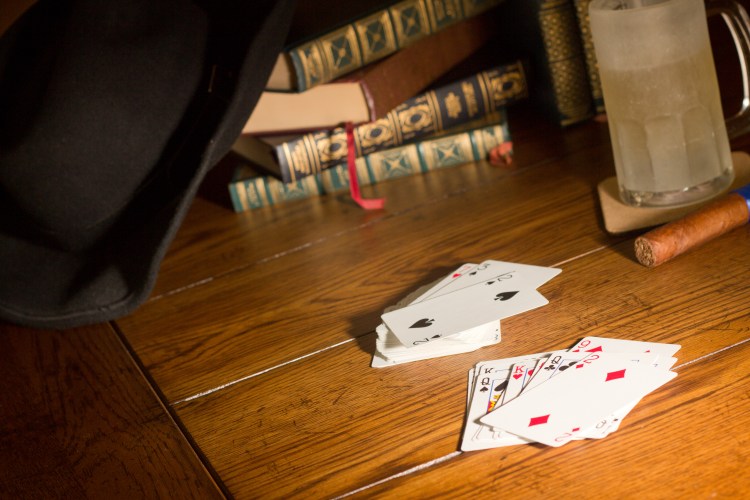Terms from sports and game have become a big part of our language and poker terms are some of the most common.
English Words and Expressions That Originated in Poker

English Words and Expressions That Originated in Poker
by Michael Wiesenberg © 2019 Great Bridge Links
English is a rich language, with many words and expressions that have been borrowed from other languages. For example, aardvark and meerkat come from Afrikaans; emir and algebra from Arabic; and shih tzu, bok choi, and chop chop (“Hurry up!”) come from Chinese.
Terms from sports and game have also become a big part of our language. We use them without thinking where they come from. When you say the ball is in your court, you are employing a tennis phrase. You use a football term when you ask someone to carry the ball or when you say that a desperate position is a fourth-down situation. You may say that something not right or unfair isn’t cricket. It’s a baseball borrowing when you say that a wildly off-target estimate isn’t in the ballpark. You invoke golf when you say that someone who has come out ahead in a desperate grasp for glory has hit a hole-in-one.
And of course, many poker terms have become part of the English language.
Non-poker-players who refer to having an ace in the hole don’t know the derivation:
ace in the hole. (n phrase) In a stud game, having an ace as one’s downcard or one of one’s downcards. This being a desirable condition, the expression has moved from the world of poker to general usage in the English language with the wider meaning of an advantage or resource kept in reserve until needed.
Most non-poker-players who say that someone has an ace up the sleeve don’t know where the term originated:
ace up the sleeve. (n phrase) Describing the situation in which a cheater has withdrawn an ace from the deck to be introduced into the game later, or, more generally, has taken some unfair advantage. The phrase passed into general usage to describe the situation in which someone is hiding some probably unfair advantage.
Has someone at the office asked you to chip in to a collection for a co-worker’s retirement or birthday?
chip in. (v phrase) Ante, or call a small bet. The term has passed into general usage meaning contribute to a collection, usually of cash.
You might say that a wealthy person is in the chips:
in the chips. (adv phrase) 1. Winning (in a gambling game). 2. The state of having lots of money.
You’ve heard it said of a person not possessing all their mental faculties that they’re not playing with a full deck:
full deck. (n phrase) An honest deck, that is, one containing all the cards. From this came the phrase playing with a full deck, which originally meant playing [poker] honestly, but was later expanded to mean rationally, and usually used in the negative, the expression having moved from the world of poker to general usage in the English language in its wider sense, as not playing with a full deck, that is, crazy or crazily.
Have you ever heard someone described as having a poker face?
poker face. (n phrase) 1. A poker player’s supposed lack of facial expression, such that others cannot tell when she is bluffing. In reality, few poker players remain expressionless doing play. The term has moved from the world of poker to general usage in the English language to describe someone who shows no emotions or reveals nothing by expression or body language. 2. A poker player who maintains such an expression. This second usage is rare.
During negotiations, people often lay their cards on the table:
lay your cards on the table. (v phrase) Show down, that is, at the end of a poker hand, if more than one player remains, reveal one’s cards to attempt to claim the pot. This expression has moved from the world of poker to general usage in the English language with the wider meaning of reveal one’s position, come clean, etc.
You can find these, and tens of thousands of other terms unique to the wonderful world of poker in The Official Dictionary of Poker: Second Edition.








